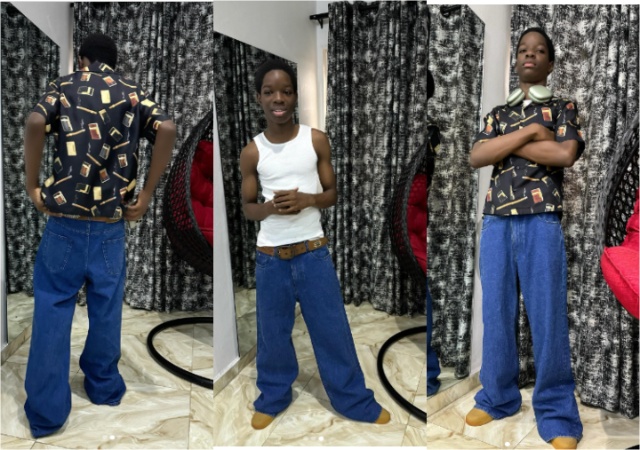Boluwatife Balogun, the firstborn son of Afrobeats superstar Wizkid, has created a significant buzz with his latest social media appearance. The young Balogun’s photos, which showcase him sporting his father’s iconic fashion style, have ignited discussions about legacy and influence in Nigeria’s entertainment industry.
The images, which quickly went viral across various social media platforms, feature Boluwatife wearing a simple white singlet paired with baggy trousers – a look that has become synonymous with his father’s casual yet distinctive fashion sense. The striking similarity between father and son’s style choices has not gone unnoticed by fans and observers, who have flooded social media with comments celebrating this visible connection between two generations of the Balogun family.
What makes these photos particularly significant is how they represent more than just a son mimicking his father’s fashion choices. They symbolize the continuation of a cultural legacy that Wizkid has built over his illustrious career. The images have sparked conversations about inheritance in Nigerian entertainment, not just of talent or wealth, but of style and cultural influence.
The timing of these photos coincides with a period when discussions about generational influence in Nigerian music are particularly relevant. As the children of first-generation Afrobeats stars begin to come of age, there’s increasing interest in how they will carry forward their parents’ legacies while establishing their own identities.
Boluwatife’s social media presence has been notably strategic, showing a careful balance between honoring his father’s influence while developing his own personality. His confident pose and natural charm in the photos suggest a young man comfortable with both his heritage and his individual identity – a quality that has resonated strongly with followers.
The response from social media has been overwhelmingly positive, with fans and observers noting not just the physical resemblance between father and son, but also the natural ease with which Boluwatife carries himself. Comments ranging from playful predictions about his future to profound observations about legacy have dominated the online discourse.
Industry observers note that this moment represents more than just a cute father-son fashion parallel. It speaks to the broader influence of Nigerian music stars on popular culture, extending beyond music to fashion, style, and social trends. The way Boluwatife has embraced his father’s aesthetic while maintaining his own youthful energy demonstrates the evolution of cultural influence across generations.
The photos have also reignited discussions about celebrity children in Nigeria’s entertainment industry. While some comments playfully suggest future competition with other industry figures, the overall tone reflects a genuine appreciation for how the younger Balogun carries himself with both confidence and humility.
What’s particularly striking about these images is their timing in relation to the current state of African music globally. As Afrobeats continues to gain international recognition, with Wizkid being one of its primary ambassadors, his son’s public image becomes part of a larger narrative about the genre’s sustainability and evolution.
The fashion choice the simple white singlet and baggy trousers – speaks to something deeper than mere clothing preferences. It represents a connection to the authentic, understated style that has become part of Wizkid’s brand, suggesting that even as African music evolves globally, certain core elements remain constant across generations.
Social media reactions have ranged from prideful acknowledgment of the family resemblance to enthusiastic predictions about Boluwatife’s future impact. The comments reflect a collective investment in the next generation of Nigerian entertainment, suggesting that fans see these young inheritors of cultural legacy as important figures in their own right.
As the photos continue to circulate and generate discussion, they serve as a reminder of how personal style and public image can bridge generational gaps and strengthen cultural continuity. In an era where African music and fashion are increasingly influential globally, Boluwatife’s natural embrace of his father’s aesthetic suggests that the future of Nigerian popular culture remains in capable hands.



